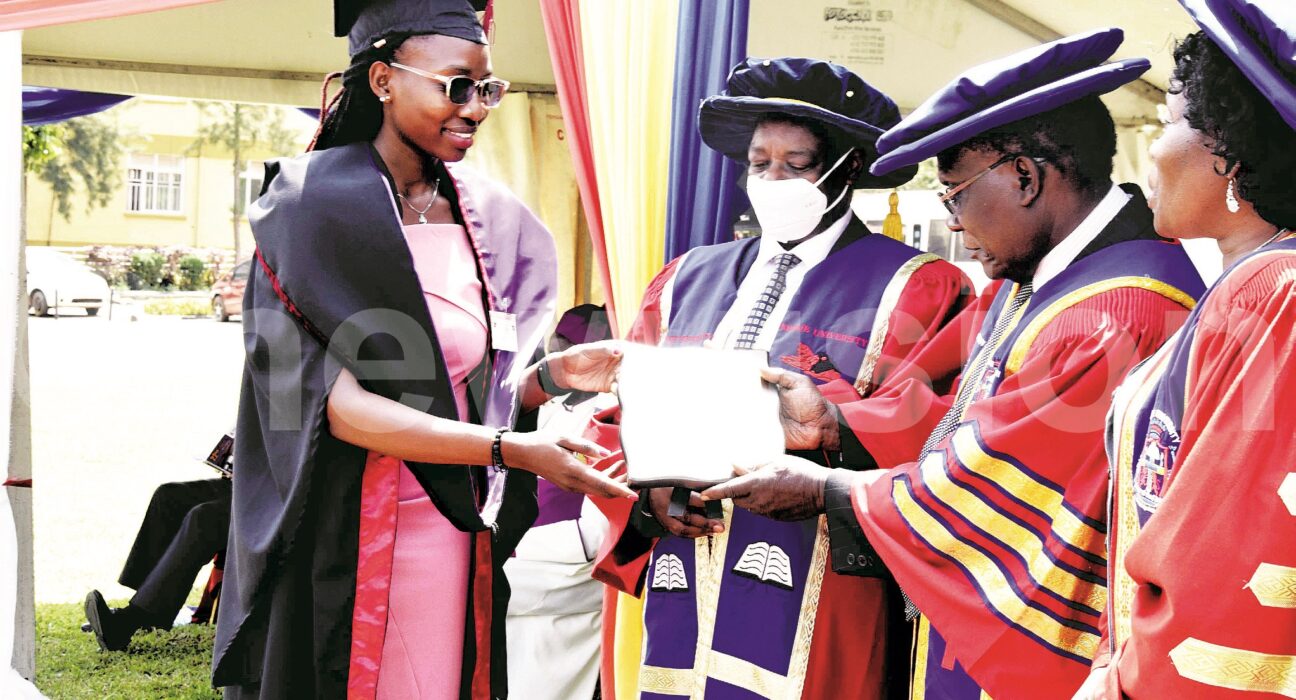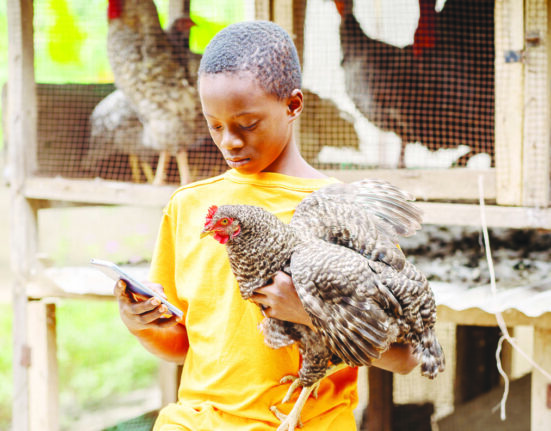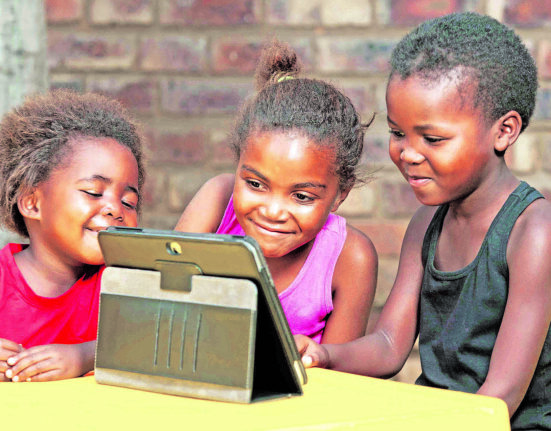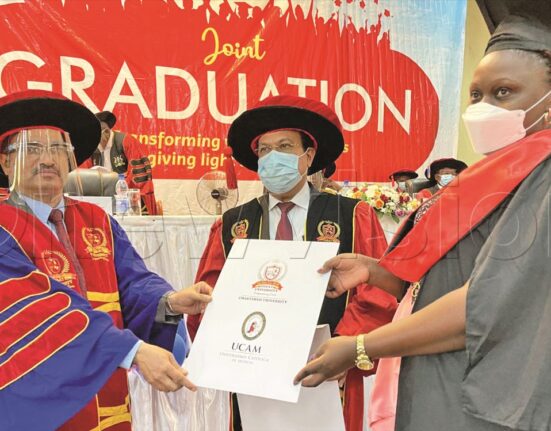This article was first published in the New Vision on April 7, 2021
By Conan Businge
The National Council for Higher Education says universities that meet the set standard operating procedures can open Graduations being held almost in every part of the city and at upcountry campuses are green flags indicating that universities have re-emerged from the COVID-19 lockdown, with all their gates now open for their students to return, though in a controlled manner. This has indeed been the case, especially during the last month of March.
This is because most of the universities in the country have now been cleared to resume full operations by the National Council for Higher Education (NCHE).
The re-opening, although not yet officially announced, has happened at different intervals unlike the case was with secondary and primary schools.
Universities are part of the many academic institutions which were gravely affected by the closure of all institutions of learning in the country to prevent the spread of COVID-19. There are about 51 universities, but all were closed in March last year by the Government to curb the spread of COVID-19.
NCHE Gives The Green Light
The NCHE executive director, Prof. Mary Okwakol, says she is aware of the re-opening of the universities. She says this has been an ongoing process which started in February.
“We asked them to draw standard programmes ensuring that the standard operating procedures (SOPs) are adhered to. We asked the universities to also send us a copy of their planned execution of the re-opening schedules and operation plans, for a follow up on monitoring,” she says.
Prof. Okwakol says the re-opening, was not tied to clearance from the NCHE.
“As long as an institution feels it has set up the required SOPs, it can proceed to re-open. We will, however, have on-spot checks on institutions to ascertain whether they are following the SOPs,” she says. Prof. Okwakol also notes that most of the institutions have already submitted their plans for the reopening and “are free to proceed and re-open”.
Process Taken To Re-Open
As the country keeps off resuming full operations in the education sector to stem the COVID-19 spread, just 70% of the universities had been cleared to teach online.
Jaliat Nabuuma, a student at Gulu University, says: “Allowing all of them to re-open, but in a controlled and staggered manner, was the lifeline for most of the universities.”
However, to ensure that there is proper learning in universities, the Government, through the education ministry in February, sent teams to all its universities to ascertain how they are handling the lecturing and assessment.
The education ministry team was sent out to seek proposals from universities on their re-opening strategy and checking their readiness to re-open.
At the time, Prof. Okwakol wrote to all universities, informing them that she was in receipt of a communication from the First Lady and education minister, Mrs Janet Museveni, informing her that universities would remain closed for the next three months.
The letter read: “Based on the advice of the Presidential Scientifi c Advisory Committee, the President (Yoweri Museveni) has guided that all higher institutions of learning should continue teaching online using the open and distance e-learning (ODEL) system for at least three months. This is so as to enable the Government find a lasting solution.”
This communication is in tandem with Mwalimu analysis and prediction that schools and higher institutions of learning may not re-open as soon as it had been anticipated, and that the earliest time of full re-opening could be in March or April.
However, with the COVID-19 vaccines in the country, the NCHE had cleared a number of universities to fully re-open, in a controlled manner.
The higher education state minister, Dr John Chrysostom Muyingo, says the Government expects all universities to be back in operation.
“All universities should open for the completion of the old academic year and start off a new one. It is important that all university councils and managements have this in mind. The earlier the better,” Dr Muyingo says.

Response To Re-Opening
Makerere University’s vicechancellor Prof. Barnabas Nawangwe says the university will hold its 71st graduation ceremony between May 10-14.
The earlier plan was to have the graduation held in March this year.
“We are making all necessary arrangements for a befitting ceremony for our gallant intellectuals,” Nawangwe says.
Apart from the graduation, the university has, alongside the graduation ceremony plans, issued a plan for the phased re-opening.
Makerere’s first-year students (freshers) are expected to register starting this week and end the process by Saturday. They are expected to start their lectures on March 1.
Makerere University’s deputy vice-chancellor for academic affairs, Ass. Prof. Umar Kakumba, says: “The rest of the students will join those of Year One on March 1. These are students in years 2, 3, 4 and 5 from the colleges of health sciences, veterinary medicine and animal biosecurity; the architecture programme and fourth year agriculture students.”
He adds that freshers will be followed by the Year Two students and other non-finalist students of other courses (who should have already started with online learning from February 8, 2021). They will report on campus for laboratory and practicums from March 28 to April 24.
Other finalists (who should have already started with online learning from February 8), Kakumba says, will report on campus for laboratory and practicums from April 22 to May 2021.
“The end of semester one examinations will follow in a staggered manner; and a detailed programme will be drawn in due course by the academic registrars/ college registrars.
“Each college registrar, in consultation with the principal, should produce a detailed plan to conduct freshers’ orientation and registration sessions on campus between February 22 and 27,” he says.
At Kyambogo University, the vicechancellor, Prof. Elly Katunguka, says the university started its operations on March 1 and expects students to report back for studies, in a phased manner.
He says three weeks of face-to-face lectures (March 1-21)) was followed by examinations for three weeks (March 22 to April 11).
The semester for the academic year 2019/2020 will end on April 11.
Prof. Katunguka adds that the first year students will self-enrol (register) online between Monday, March 22 to April 11.
“They then will officially report to campus for face-to-face lectures on Saturday this week on April 10,” he says.
Prof. Katunguka explains that the detailed programme for semesters one and two of the academic year 2020/2021 and proposals for graduation will be communicated at a later date.
Other private universities such as Victoria University, re-opened for the students a couple of weeks ago.
Victoria University’s vice-chancellor Dr Lawrence Muganga says students will be taught concurrently using online platforms and physical classes since the university was cleared by the NCHE for blended learning.
Some of the classes will also be conducted in the evening and on weekends to ably utilise the available space in the university.
“We have resumed and we expect all the new and old students to report back for studies,” he says.
At Busitema University, the academic registrar, Dr Lilian Gimuguni, says the university reopened on March 1 and will close this semester on April 22.
The university started face-to-face sessions for first and second-year students. The rest of the students in year three, four and five are studying online. Starting on April 25 to May 29 this year; the first and second-year students take to online studying and their seniors in the other years will now get face-to-face sessions.
All students are expected to do examinations at the same time, starting May 31 to June 26.
Gimuguni says: “It should be noted that campuses of Mbale, Pallisa and Namasagali do not have to stagger the studying for students, since they have ample space to handle the SOPs. However, all students will do examinations on the stipulated dates.”
Ndejje University’s vice-chancellor Prof. Eriabu Lugujjo says the university is now open for all students in a systematic way that avoids crowding.
“We pay utmost attention to SOPs as set by the Government. We must gradually start learning to live with this COVID-19. This is the only way we can get the universities back running,” he says.
Other universities such as the International University of East Africa, ISBAT University, Uganda Christian University, Uganda Martyrs University, Kampala University and Kampala International University have already re-opened fully.
Other universities which are operating and have already written to NCHE include Mbarara University of Science and Technology, Kabale University and Islamic University in Uganda.

SOPS Set By The Government
- Set up a school COVID-19 task team appropriate to the local context.
- Promoting physical distancing at the institution to maintain at least a two metre distance apart at all times.
- Correct wearing of recommended face masks by students, workers and visitors in institutional settings, either in lectures, corridors, compound or communal areas, or in accordance with age categories.
- Policies that protect staff, lecturers and students who are at high risk due to age or underlying medical conditions, with plans to cover absent teachers and continue to remote education to support students unable to attend school, accommodating individual circumstances to the extent possible.
- Strategies for ensuring adequate ventilation in public buildings, including classroom, hygiene and environmental cleaning measures, including hand-washing, respiratory etiquette, use of protective equipment and cleaning procedures for facilities.
- Encourage the use of hand sanitiser and the importance of compulsory use of soap during hand-washing.
- Post signs with visual cues and school wide announcements on how COVID-19 is transmitted, encouraging frequent hand hygiene, wearing of face masks at the gate and other visible areas in the school.
- Screening and managing sick students, and staff and provision of space to temporarily separate sick students and staff without creating stigma. Create and share information with learners and their parents to decide whether to go to school or remain at home.
- When students or staff become unwell, and thresholds are reached, a district outbreak response system will take appropriate action to limit further spread in the school as well as in the community.









Leave feedback about this